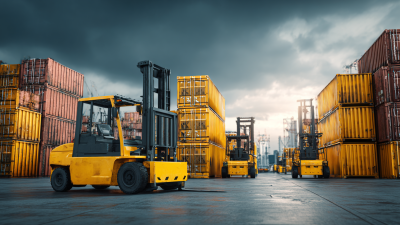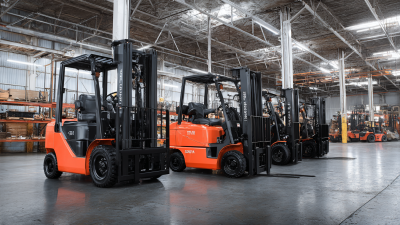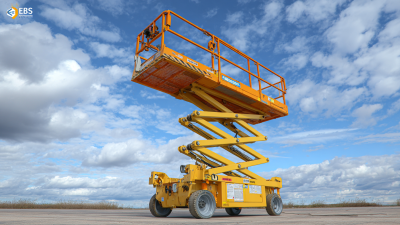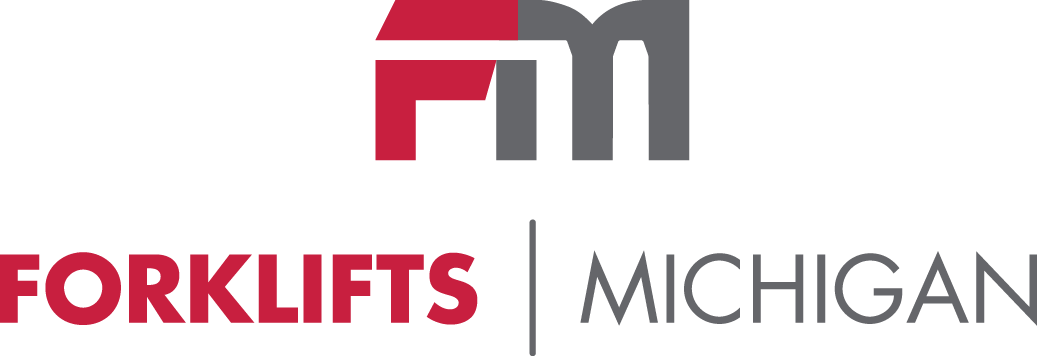7 Best Practices for Choosing Forklifts Rental Solutions
When it comes to managing material handling operations efficiently, the decision to opt for Forklifts Rental can significantly impact your business's productivity and bottom line. With a myriad of options available in the market today, selecting the right rental solution requires a strategic approach and a clear understanding of your specific operational needs. In this blog, we will explore seven best practices that will guide you in choosing the most suitable forklifts rental solutions. From assessing your workload and operational environment to considering rental duration and the type of forklifts needed, these practices will help you navigate the complexities of rental decisions effectively. Whether you are a small business or a large corporation, making informed choices in your forklift rental strategy will ultimately enhance your efficiency and reduce costs, ensuring you stay ahead in today's competitive landscape.

Understanding the Different Types of Forklifts Available for Rent
When considering forklift rental solutions, understanding the various types of forklifts available is crucial for making the right choice for your operational needs.  Electric forklifts are ideal for indoor use, offering a clean and quiet alternative that is perfect for warehouse environments. Their lack of emissions makes them suitable for handling goods in close quarters, where air quality is a concern. Additionally, electric models typically feature lower operating costs over time due to their efficient energy consumption.
Electric forklifts are ideal for indoor use, offering a clean and quiet alternative that is perfect for warehouse environments. Their lack of emissions makes them suitable for handling goods in close quarters, where air quality is a concern. Additionally, electric models typically feature lower operating costs over time due to their efficient energy consumption.
On the other hand, internal combustion forklifts, powered by gasoline, propane, or diesel, are better suited for outdoor applications. They deliver robust performance and can navigate uneven terrains effectively, making them a go-to option for construction sites and large outdoor facilities. Moreover, the versatility of rough terrain forklifts allows them to manage challenging ground conditions, providing extra stability and lifting capacity when needed. By carefully assessing the specific types of forklifts and their capabilities, businesses can optimize their rental solutions and ensure they select the appropriate equipment for their projects.
Key Factors to Consider When Choosing a Forklift Rental Company
When selecting a forklift rental company, several key factors should guide your decision. First and foremost, the size and age of the rental fleet are crucial. According to the Industrial Truck Association (ITA), forklifts older than 10 years account for nearly 30% of reported incidents. Therefore, choosing a company with a well-maintained, modern fleet ensures safety and efficiency during operations. Look for rental services that regularly update their inventory, providing access to the latest technology and safety standards.
Another critical factor to consider is the level of customer service and support offered by the rental company. A recent survey by Material Handling Industry (MHI) highlighted that 65% of material handling professionals prioritize service quality when selecting equipment providers. Good customer support can significantly reduce downtime through prompt maintenance and repairs. Additionally, many rental companies now offer flexible rental agreements that cater to peak seasons or fluctuating project demands, which can provide significant cost savings and operational flexibility. Choosing a forklift rental provider with a strong commitment to customer service can enhance productivity while ensuring that your equipment meets all operational requirements.
7 Best Practices for Choosing Forklifts Rental Solutions - Key Factors to Consider When Choosing a Forklift Rental Company
| Key Factors | Description | Importance Level |
|---|---|---|
| Fleet Availability | Ensure the provider has a wide range of forklifts to meet your needs. | High |
| Service and Maintenance | Inquire about the maintenance and repair services included in the rental agreement. | High |
| Rental Costs | Compare the rental rates across different companies to ensure competitive pricing. | Medium |
| Customer Support | Check the availability of customer support and how quickly they respond. | High |
| Delivery and Pickup Services | Assess the provider's policies on delivery and pickup of the rented forklifts. | Medium |
| Insurance Options | Evaluate the insurance options available for the forklifts during the rental period. | Medium |
| Rental Agreement Terms | Review the terms and conditions of the rental agreement to avoid surprises. | High |
Assessing Your Warehouse's Unique Needs Before Renting a Forklift
When considering forklift rental solutions, it's crucial to assess your warehouse's unique needs thoroughly. According to a report by the Material Handling Industry of America (MHIA), nearly 40% of warehouse operators experience operational inefficiencies due to inappropriate equipment choices. Therefore, understanding the specific requirements of your warehouse—such as load capacity, lift height, and floor space—can significantly affect productivity and safety. Tailoring your rental choice to the unique demands of your operations can mitigate risks and maximize efficiency.
Moreover, warehouse layouts can vary widely, impacting the type of forklift best suited for the job. A survey conducted by the Warehouse Education and Research Council (WERC) indicated that 60% of warehouses utilize narrow aisle configurations, which may necessitate a compact forklift design. Additionally, understanding the types of goods handled—ranging from perishable items to heavy machinery—can dictate whether you need specialized equipment, like refrigerated forklifts or high-capacity models. By conducting a thorough assessment of your warehouse's characteristics, you can make informed decisions that enhance operational effectiveness and align with industry standards.

Evaluating Rental Costs and Hidden Fees in Forklift Solutions
When considering forklift rental solutions, one of the most crucial aspects to evaluate is the total cost of the rental, which often includes various hidden fees. According to a report by the Material Handling Industry of America (MHIA), rental costs can vary significantly, with businesses sometimes facing additional charges that can inflate the initial quote by up to 30%. These hidden fees might encompass delivery charges, maintenance costs, and insurance requirements. Companies must carefully scrutinize the terms of the rental agreement to avoid unexpected expenses that can derail budget projections.
In addition to upfront costs, it's essential to consider potential ancillary expenses such as fuel surcharges and damages. A study conducted by the Industrial Truck Association (ITA) revealed that nearly 40% of businesses reported that miscalculating these fees hindered their profitability. To mitigate these risks, it is advisable to request a detailed breakdown of all potential costs associated with the forklift rental. By doing so, companies can ensure they are making a fully informed decision that aligns with their operational needs while also safeguarding their financial health.
Ensuring Safety and Compliance in Your Forklift Rental Process
When it comes to forklift rentals, safety and compliance should be at the forefront of every decision. Understanding the specific regulations governing forklift operation in your industry is crucial. Each state and municipality may have differing requirements regarding operator certifications, maintenance records, and safety inspections. Before finalizing your rental agreement, ensure that the provider adheres to these regulations and that their equipment meets all safety standards. This not only protects your employees but also minimizes liabilities for your business.
Additionally, it's essential to prioritize the training of your operators. Proper training reduces the risk of accidents and ensures that your team can navigate the equipment effectively. Consult with your rental provider on available training programs that cover both equipment operation and safety protocols. Regular audits and safety checks during the rental period can further ensure compliance and enhance workplace safety. By taking these steps, you can create a more secure work environment and demonstrate responsible hiring practices that resonate with clients and partners alike.
Related Posts
-

The Ultimate Guide to Forklifts Rental for Your Business Needs
-

2025 Trends in Global Procurement for Best Scissor Rental Solutions
-

What is the Ultimate Guide to Best Scissor Rental for Global Buyers
-

Unveiling the Top Forklifts Rental Options for Global Buyers to Consider
-

Solutions for Optimizing Your Operations with Best Scissor Lifts
-

Mastering Equipment Parts: A Comprehensive Guide to Optimal Performance and Longevity


